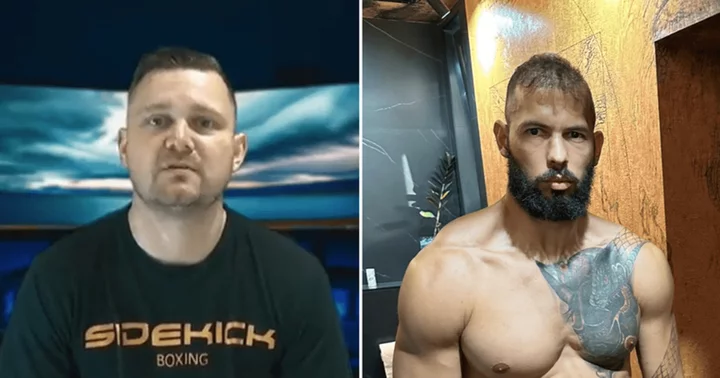BUCHAREST, ROMANIA: Andrew Tate, whose name has been frequently appearing in the headlines on mainstream media, came into the spotlight after his arrest in December 2022, which was carried out by the Romanian authorities. Shedding light on the situation, Daniel Knight, a close friend and former business partner of Tate and his brother Tristan, spoke about various aspects of their lives. He discussed their early life in Luton and how Tate's online persona evolved from being a relatively unknown kickboxer in the UK to becoming a prominent figure on the internet.
At the beginning of 2022, Tate's presence exploded across various social media platforms such as YouTube, TikTok and Instagram. It was through his short-form videos that he garnered significant attention, although not always for positive reasons. These videos were criticized for promoting opinions that were widely seen as sexist, misogynistic and vulgar. Despite the controversy surrounding his content, Tate appears to have mastered the art of leveraging affiliate marketing strategies, allowing him to effectively manipulate algorithms and ensuring the widespread exposure of his videos on all major online platforms. This strategic approach ultimately catapulted him into the limelight and as a result, he became one of the most searched and talked-about personalities on the internet.
Who is Daniel Knight?
Knight, a British kickboxer and entrepreneur hailing from Brighton, was born on April 12, 1983. Demonstrating remarkable entrepreneurial skills from a young age, Knight ventured into his first business venture at age of 23. He established a vehicle accident repair center, showcasing his knack for identifying business opportunities and taking initiative. However, it was his venture into the world of kickboxing and martial arts equipment that truly brought him widespread recognition. As the founder of Sidekick Boxing, Knight revolutionized the market with his innovative and creative approach. In 2010, he astutely recognized the potential of blending art and sport, and thus, he launched Sidekick, a kickboxing equipment brand inspired by graffiti. This unique and visually striking concept captured the attention of enthusiasts and practitioners alike, quickly establishing Sidekick Boxing as a significant player in the industry.
Knight's journey to success didn't end with the launch of Sidekick Boxing, rather, it continued to flourish as the brand's reputation grew. One of the most significant milestones for Sidekick Boxing was its association with Tate. As the main sponsor for Tate throughout his competitive career, Sidekick Boxing's presence was further solidified in the world of kickboxing. Tate's popularity as a kickboxer and later as a prominent internet personality brought even more attention to the brand, amplifying its reach and impact.
Daniel Knight on Andrew Tate's polarizing stance on masculinity
Knight expressed concerns about people discussing masculinity, stating that there seemed to be an issue with it. He believed that overly coddling young men led them to becoming overly sensitive, often referred to as "snowflakes," and contributing to a rise in suicide rates and mental health challenges among men. Conversely, he acknowledged that Tate's message had a positive impact, encouraging young men to take control of their lives, prioritizing fitness by going to the gym and striving for continuous improvement.
Knight said, "What’s wrong with people speaking about masculinity!”
Knight did not entirely subscribe to Andrew Tate's concept of the matrix, which suggested that it controlled every aspect of a financially struggling person's life and could only be escaped through wealth gained via Tate's online courses. However, he did share the belief that government policies and rigid taxation procedures perpetuated poverty for many individuals. Hence, he remained optimistic about Tate's broader message to the world.
Despite viewing Tate as a controversial influencer, Knight was grateful for the impact the influencer had on his company. He considered working with Tate as one of the best decisions he had made. Through their friendship, Knight gained opportunities to appear on various podcasts and documentaries, including a new Channel 4 documentary focused on the Tate brothers. Additionally, Knight had been interviewed by several publications, such as The Sun, further boosting his exposure and recognition. Although they still kept in touch via WhatsApp, their conversations didn't usually revolve around business matters these days.
Daniel Knight on Andrew Tate's Luton roots and Romania arrest
In 2016, Tate gained attention when he was kicked out from the UK reality TV show 'Big Brother' due to a viral video clip in which he appeared to be hitting a woman. While he later asserted that the encounter was consensual, the incident became a focal point of controversy. Following this incident, the Tate brothers decided to start a webcam business as a means to quickly earn money. Knight vividly remembered the Tate brothers setting up business in their mother's home in Luton and collaborating with a few girls they knew.
As time passed, the Tate brothers recognized the vast potential of the webcam industry and decided to move their business operations to Romania, seeking to capitalize on the country's more lenient laws and regulations concerning this line of work. At this juncture, Knight's company chose to part ways with the Tate brothers, mainly due to the stark differences in their respective industries.
As a result, Knight found himself unable to provide any definitive insights regarding the series of allegations that had been brought against Tate by the Romanian authorities and his arrest after their relocation. The move to Romania marked a turning point in the Tate brothers' entrepreneurial journey, leading to both opportunities and challenges as they expanded their business, and faced new legal and regulatory landscapes.
Daniel Knight on Andrew Tate's stance on women
Knight appeared to adopt a neutral stance concerning Tate's controversial and sexist remarks. He stated that he agreed with some of Tate's viewpoints while rejecting others. Moreover, Knight revealed that during their past association, Tate had never exhibited rudeness or disrespect towards women. Instead, he was perceived as "nice, polite, and charming." Women seemed to be drawn to the Tate brothers due to their appealing looks and charismatic personalities. Knight attributed the media's attempt to portray Tate as something he wasn't, suggesting that there might be misrepresentation and sensationalism at play.
Knight said, "The media’s trying to make him into something he’s not.” He believed that Tate's message was primarily aimed at empowering young men, rather than undermining women's contributions to society. He asserted that he did not think Tate intended to belittle women, as no one would desire such an outcome. He opined that Tate's advocacy was more centered on promoting masculinity in a positive light.
Knight said, "I don’t think he[Andrew Tate] wants women to be looked down at. And I don’t think anyone would want that….I don’t think he’s ever put women down. I think he’s speaking for pro masculinity.”
Nonetheless, despite Knight's disagreement, he did not see Tate's jokes about women being bad drivers or risky as airline pilots, among other topics, as having any detrimental impact on women's rights in the workplace. However, it was evident that Tate's penchant for emphasizing physical differences between men and women to bolster his controversial ideas had garnered widespread criticism. Various women's rights advocates believed that such a primitive focus on physiology, regardless of its satirical nature, could potentially contribute to an increase in violence against women.









